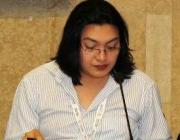Nassef Manabilang Adiong, PhD is assistant professor at the Institute of Islamic Studies (UP IIS), co-convenor of the Center for Integrative and Development Studies’ Islamic Studies Program (UP CIDS-ISP), and affiliate faculty member at the Center for International Studies (UP CIS). All institutions are based at the University of the Philippines Diliman. He is the Professorial Chairholder in Political Science and International Relations at the Polytechnic University of the Philippines, Manila.
He works on comparative research between Islam and International Relations, including Islam's relations to Bangsamoro (the Muslim minority in the Philippines) and to Euro-American Modernity. He created the IR-IS Research Cohort on December 2012 that became Co-IRIS (International Relations and Islamic Studies Research Cohort) on November 2013. While on September 2015, he founded the Philippine International Studies Organization (PHISO), the leading professional association of International Studies' scholars, teachers, and students in the country.
He authored, edited, and co-edited articles and edited volumes of topics and issues about ‘Islam and International Relations’ published by the Alternatives: Turkish Journal of International Relations (2009), The Quarterly Journal of Political Studies of Islamic World (2012), SAGE Publications (2012), ABC-CLIO (2012, 2014, 2017), Journal of Islamic State Practices in International Law (2013), Cambridge Scholars Publishing (2013), Islamic Perspective Journal (2015), Palgrave Macmillan (2016), Blackwell Reference Online (2016), Routledge (forthcoming 2018), Oxford Research Encyclopedia of International Studies (forthcoming 2018), and Oxford Islamic Studies Online (forthcoming 2018).
Nassef is the chief editor of the “International Relations in Southeast Asia” book series (Routledge, UK) and co-editor of the “Islam and International Relations” book series (Gerlach Press, Germany). He is presently serving, and has served, as reviewer of Foreign Policy Analysis (2017), Millennium: Journal of International Studies (2017), Palgrave Macmillan (2017), International Journal of Religion and Spirituality in Society (2016), International Journal of Community Diversity (2016), GEOPOLITICA (2016), Global Studies Journal (2012-2018), including Philippine-based journals such as The Mabini Review(2016-present), IQRA: The Journal of Al-Qalam Institute of Islamic Identities and Dialogue in Southeast Asia (2017-present), and Lux Veritatis: Journal of Interdisciplinary Studies (2017-present).
Nassef is interested to supervise thesis and dissertation that are related to the following themes/topics:
• Islamic theories of International Relations
• Islam in International Relations theory
• Islamic approaches to World Politics
• Islam and Democracy
• Islam and Modernity
• Islam and Diplomacy
• Islam and Geopolitics
• Islam in Southeast Asia
• Islam and Foreign Policy
• Islam and the Bangsamoro
• Islam and International Law
• Islam and International Organizations
• Islam and Global (Non-Western) International Relations
• Comparative World Religions: Religion in the ‘International’
**Thesis or dissertation proposals that are able to link any philosophical, spiritual, theological, juristic, mystical and/or social scientific relations of knowledge in Islam with the themes/topics mentioned above are highly preferred.
**Submit a concept note (between 500 and 1000 words) that explains:
[1] its rationale and paradigm (reasons behind the research problem, its purpose, and selection of theories and methods; OR for a dissertation, your defense of your new concept, theory, method and/or practice),
[2] scope (the extent of the area or subject matter including its limitations),
[3] significance to a theme/topic selected above (i.e. how it is relevant to the chosen theme/topic?),
[4] literature review with at least 10 annotated references for a thesis and 20 annotated references for a dissertation,
[5] mention at least two ethical considerations and their importance (these are, justice, beneficence, nonmaleficence, and honors and respects autonomy of persons involved), and
[6] notable contribution to existing scholarship.
**A thesis is your validation of what you have learned throughout the course of your educational life, while a dissertation is your contribution of new knowledge (concepts, theories, methods and/or practices) to your field.
**A concept note is also needed for those who would select Nassef as their external reviewer and part of their thesis or dissertation committee in other UP units or in other institutions and universities in the Philippines and abroad.

